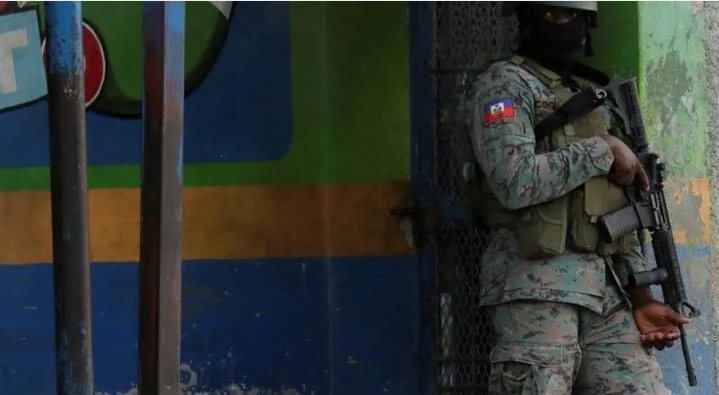Soldiers have been deployed to defend the airport of the Haitian capital, Port-au-Prince, from an assault by armed gangs.
The gangs’ aim is to prevent the return to Haiti of Prime Minister Ariel Henry, who is believed to be abroad.
Violence has spiralled in his absence with the gangs demanding he resign.
His more recent whereabouts had been unknown but local media reported on Tuesday that he landed in Puerto Rico after the Dominican Republic closed its airspace.
While Mr Henry was in Kenya, a coalition of gangs led by a former police officer, Jimmy “Barbecue” Chérizier, went on the offensive, attacking police stations and storming two of Haiti’s biggest prisons.
About a dozen people were killed in the attack on the prisons. Thousands of inmates escaped and remain on the loose.
A minister standing in for Mr Henry declared a 72-hour state of emergency.
Haitian newspaper Le Nouvelliste reports that both international and national commercial flights have been suspended for the past days due to the violence. Le Nouvelliste added that no private planes had landed or taken off from the airport either.
An attempt by gunmen to breach the airport compound through a hole in a wall was reportedly repelled by security forces.
Control of the airport is key to the gangs’ aim of stopping Prime Minister Henry from coming back to the country.
The gang leader known as Barbecue has been calling for his ouster since the prime minister was sworn in as the successor to President Jovenel Moïse in July 2021.
Already rampant gang violence was further fuelled by the murder of President Moïse by Colombian mercenaries, which left a power vacuum in the country.
Armed gangs, wielding weapons smuggled in from the US, have gained control of an estimated 80% of the capital in recent years.
Prime Minister Henry has asked the international community to send troops to help fight the gangs. But a plan for Kenya to send 1,000 police officers to help contain the violence stalled after the Kenyan High Court blocked it.
Mr Henry was in Nairobi for talks with Kenyan President William Ruto to try to salvage the deployment, when the latest violence flared.
On Saturday, his gang attacked several police stations before freeing thousands of prisoners from the National Penitentiary and from the Croix des Bouquets jail.
Only about 100 prisoners remained in their cells at the National Penitentiary, prison officials said.
Among those who stayed put were 17 Colombian ex-soldiers suspected of having carried out the assassination of President Moïse.
In a video, they pleaded for help, saying that other inmates were trying to get them to leave their cells and were going to use them “as cannon fodder”.
The Colombian foreign ministry later announced that the 17 had been transferred to a different prison.
Residents of the capital mainly stayed at home on Monday with only a few people venturing out to get drinking water or food, the AFP news agency reported.
Speaking from Haiti, Serge Dalexis from the International Rescue Committee said it had become extremely difficult for people to access basic services such as health care, food and water.
“There’s a lack of everything now in Port-au-Prince,” Mr Dalexis said, adding that shooting was being reported in many areas of the city.
An estimated 15,000 people have been displaced from their homes over recent weeks due to the violence.



